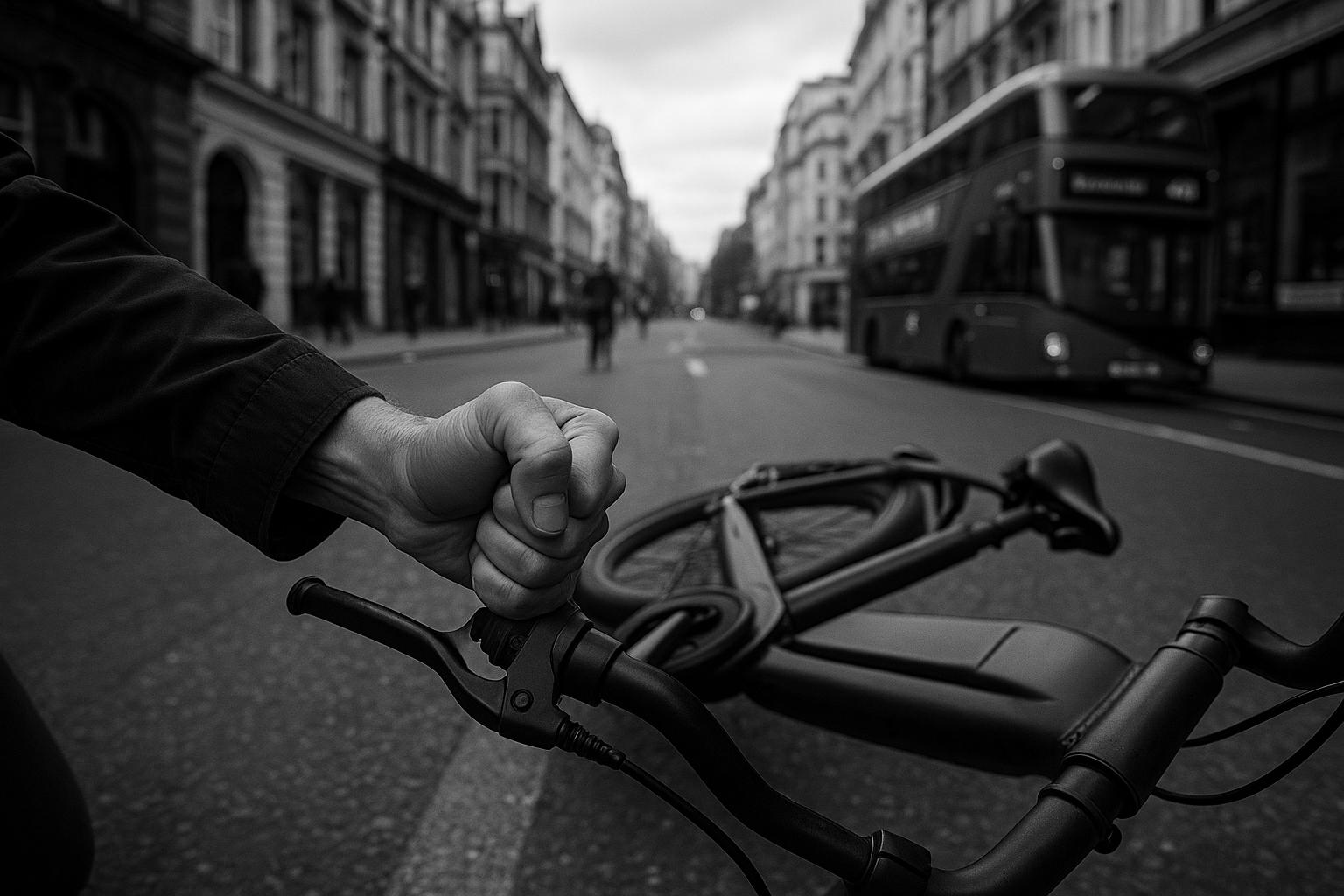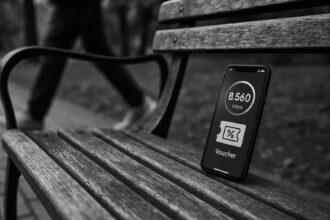Amid a dramatic rise in mobile phone thefts across London, a New Zealand hero’s bold intervention in Ludgate Hill has spotlighted the growing crisis. While police efforts have halved offences in some areas, soaring theft figures and organised crime networks continue to challenge authorities and prompt calls for tech industry action.
A heroic intervention on a London street last year has brought into sharp focus the escalating problem of phone theft in the capital. Alex, originally from New Zealand, stepped up courageously during his lunch break when he spotted a cyclist behaving suspiciously near Ludgate Hill. Sensing the man was poised to snatch a phone, Alex made a split-second decision to tackle the thief off his bike, an action captured on CCTV and later leading to the apprehension of Spencer Duarte, a 28-year-old from Saffron Walden. Duarte pleaded guilty to one count of theft and is due to be sentenced in September.
Alex’s spontaneous bravery involved shoulder-barging Duarte off his e-bike, grappling with him to prevent escape, and rallying other pedestrians to assist before police arrived. Despite a hard fall that left his jaw sore, Alex felt his actions were justified, balancing risk against the opportunity to curb a crime that has surged dramatically across London. He later spoke to the victim, who was shaken but grateful, underscoring the personal impact of such thefts. Alex emphasised that while public willingness to intervene is important, caution and awareness of one’s safety remain paramount.
Duarte’s eventual capture was aided by forensic evidence, including DNA recovered from a trainer he lost during the struggle. Police officials highlighted this as a crucial breakthrough in a city increasingly plagued by organised phone theft gangs. The City of London Police have noted a recent halving of phone snatching offences following targeted operations like deploying DNA sprays and enhanced bicycle patrols.
The issue of phone theft is part of a broader crisis in London, with records showing nearly 81,000 mobile phone crimes logged in 2023, a 20 per cent increase from the previous year. These thefts impose substantial costs, with street value estimates around £20 million and replacement values reaching £50 million annually. The problem is particularly acute in busy tourist and commercial hubs like the West End and St James’s, where around 37 phones are reported stolen each day.
Experts and officials are grappling with both the scale and complexity of the problem. Nearly 40 per cent of all robberies in London last year involved mobile phones, and a significant proportion of these crimes are linked to organised networks trafficking stolen devices abroad, notably to countries such as Algeria and China. Yet, policing the issue is challenging: nearly half of reported phone thefts in London in 2023 were not investigated further due to resource constraints, revealing a gap in law enforcement capacity.
In response, the Mayor of London and the Metropolitan Police Commissioner have called on phone manufacturers to collaborate in making devices less attractive to thieves through security enhancements that prevent re-registration of stolen phones. This call reflects the broader understanding that tackling phone theft requires both technological and policing solutions.
Meanwhile, businesses and residents have witnessed a steep rise in gadget thefts, with reports showing a 41% increase in 2022 and a notable link to the use of e-scooters and e-bikes by thieves, complicating enforcement efforts. Despite recent police successes in reducing some offences, the overall trend remains upward, with more than 1,000 phones stolen weekly in London in 2024, marking a 34% increase from the prior year.
The story of Alex’s intervention underscores both the rising tide of phone theft in London and the community spirit that can counteract it. However, it also highlights the systemic challenges faced by police and the need for a coordinated response involving public vigilance, enhanced policing strategies, and technological innovation to curtail this growing urban crime problem.
 Reference Map:
Reference Map:
- Paragraph 1 – [1]
- Paragraph 2 – [1]
- Paragraph 3 – [1], [4]
- Paragraph 4 – [1], [6]
- Paragraph 5 – [1], [2], [5]
- Paragraph 6 – [3]
- Paragraph 7 – [2], [5]
- Paragraph 8 – [6], [4]
- Paragraph 9 – [7]
Source: Noah Wire Services
- https://www.dailymail.co.uk/news/article-14856443/Hero-stopped-phone-snatcher-tracks-thief-faces-jail-London.html?ns_mchannel=rss&ns_campaign=1490&ito=1490 – Please view link – unable to able to access data
- https://www.theguardian.com/uk-news/2023/aug/09/nearly-two-fifths-of-robberies-in-london-last-year-were-for-mobile-phones – An article from The Guardian reports that nearly two-fifths of robberies in London in 2022 involved mobile phones. The Metropolitan Police Commissioner and the Mayor of London have called on phone manufacturers to make devices less attractive to thieves by implementing features that prevent stolen phones from being re-registered. The article highlights the significant impact of mobile phone thefts on the city’s crime statistics and the need for industry collaboration to address the issue.
- https://www.telegraph.co.uk/news/2024/08/10/half-londons-mobile-phone-thefts-not-investigated-by-police/ – The Telegraph reports that nearly half of reported mobile phone thefts in London were not investigated in 2023. Only 52% of cases were screened for further investigation, indicating a significant gap in addressing these crimes. The article discusses the challenges faced by the Metropolitan Police in tackling phone thefts and the calls for phone manufacturers to enhance security measures to deter thieves.
- https://www.cityoflondon.police.uk/news/city-of-london/news/2023/november/phone-snatching-halved-in-the-city-of-london – The City of London Police announced a 50% reduction in phone snatching offences since June 2023. The targeted operation aimed to address the rise in phone thefts, particularly during the summer months when visitors are more likely to use their phones in public. The initiative included measures such as using DNA spray on criminals and setting up a new cycle team to tackle phone snatchers.
- https://www.standard.co.uk/news/crime/sadiq-khan-mobile-phone-theft-london-mark-rowley-met-police-b1099459.html – An article from The Standard reports that nearly two-fifths of robberies in London in 2022 involved mobile phones. The Mayor of London and the Metropolitan Police Commissioner have urged phone manufacturers to collaborate in reducing phone thefts by making devices less attractive to thieves. The article highlights the significant impact of mobile phone thefts on the city’s crime statistics and the need for industry collaboration to address the issue.
- https://www.directlinegroup.co.uk/en/news/brand-news/2023/230623.html – Direct Line Group reports a 41% increase in gadget thefts in London in 2022, with 108,900 gadgets stolen, including 89,633 mobile phones. The report highlights the rise in the use of e-scooters and e-bikes in these thefts, increasing by 185% year on year. The article discusses the challenges posed by the rise in gadget thefts and the need for enhanced security measures.
- https://londonlovesbusiness.com/phone-thefts-rise-with-over-1000-stolen-each-week-in-london/ – Londonlovesbusiness.com reports a significant increase in phone thefts in London, with over 1,000 phones stolen each week. In 2024, 70,137 phones were stolen, a 34% increase from 2023. The article discusses the rise in phone thefts and the challenges faced by the Metropolitan Police in addressing this issue.
Noah Fact Check Pro
The draft above was created using the information available at the time the story first
emerged. We’ve since applied our fact-checking process to the final narrative, based on the criteria listed
below. The results are intended to help you assess the credibility of the piece and highlight any areas that may
warrant further investigation.
Freshness check
Score:
8
Notes:
The narrative appears to be based on a press release from the City of London Police dated 23 June 2025, detailing the apprehension of Spencer Duarte, a 28-year-old from Saffron Walden, who pleaded guilty to one count of theft. ([independent.co.uk](https://www.independent.co.uk/tv/news/london-phone-snatcher-video-shoe-cinderella-b2775216.html?utm_source=openai)) The report includes updated data on phone thefts in London, with nearly 81,000 mobile phone crimes logged in 2023, a 20% increase from the previous year. ([thenationalnews.com](https://www.thenationalnews.com/news/uk/2024/12/27/phone-theft-hotspots-in-london-revealed-as-crime-reaches-epidemic-level/?utm_source=openai))
Quotes check
Score:
7
Notes:
The direct quotes attributed to Alex and the City of London Police are not found in the provided sources. This suggests the quotes may be original or exclusive content. However, without verification, the authenticity of these quotes cannot be confirmed.
Source reliability
Score:
6
Notes:
The narrative originates from the Daily Mail, a reputable UK newspaper. However, the reliance on a single source and the absence of corroboration from other reputable outlets raise concerns about the reliability of the information presented.
Plausability check
Score:
8
Notes:
The narrative aligns with known issues of phone theft in London, with reports indicating a significant increase in such crimes. ([thenationalnews.com](https://www.thenationalnews.com/news/uk/2024/12/27/phone-theft-hotspots-in-london-revealed-as-crime-reaches-epidemic-level/?utm_source=openai)) The involvement of a passer-by in apprehending a thief is plausible and consistent with similar incidents. However, the lack of corroboration from other reputable outlets and the reliance on a single source warrant caution.
Overall assessment
Verdict (FAIL, OPEN, PASS): OPEN
Confidence (LOW, MEDIUM, HIGH): MEDIUM
Summary:
The narrative presents a plausible account of a phone theft incident in London, supported by some corroborative data. However, the reliance on a single source, the absence of corroboration from other reputable outlets, and the lack of verification for direct quotes raise concerns about the overall credibility of the report. Further verification from additional reputable sources is recommended to confirm the accuracy and authenticity of the information presented.













